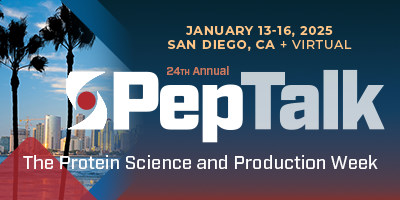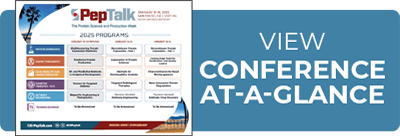
소그룹에 의한 원활한 디스커션으로, 인터랙티브 참가에 의해 포커스 토픽에 관한 문제 해결 및 향후 협업으로 연결됩니다.
버즈란?
PepTalk의 버즈 세션은 업스트림 공정의 단백질 발현과 생산부터 다운스트림 공정의 스케일 업과 제조까지 중요하고 흥미로운 토픽에 대해 참가자가 자극적인 디스커션을 펼칩니다. 공통의 관심을 가진 다양한 분야의 과학자 사이에서 브레인스토밍과 인터랙티브 문제 해결을 시행하는 모더레이터 진행형 디스커션입니다.
화요일 4:15 - 5:00 PM
Recombinant Protein Production Part 1
BuzZ Table 1: Getting the Math Right: Adding and Subtracting Post-Translational Modifications (PTMs) to Recombinant Proteins
Moderator: Christopher Cooper, PhD, Director and Head of Protein Sciences, CHARM Therapeutics
- Choosing an appropriate QC method for your budget
- Moving on from biotinupcoming alternative protein labelling technologies
- Challenges in addition of site-specific PTMs (e.g. phosphorylation) and protein PTMs (e.g. ubiquitin, SUMO)
- Advances in (de)glycosylation and its analysis
BuzZ Table 2: Improving Membrane Protein Yield and Quality
Moderator: Neha Bhat, PhD, Sr Scientist, Biologics Discovery, Johnson & Johnson Innovative Medicine
- Advancements in detergents and nanodisc technologies
- Emerging techniques to overcome instability
- High-throughput screening and process automation approaches
- Overcoming Glycosylation and Post-Translational Challenges
- Case studies and practical challenges
Automation in Protein Sciences
BuzZ Table 3: Balancing High-Throughput Expression with Data Capture/Analysis
Moderator: James Kostas, Senior Scientist, Protein and Structural Chemistry, Merck
- How do we track data captured at every stage of the protein production lifecycle?
- Is higher throughput ALWAYS better or does it just push the bottleneck downstream?
- How do we connect, analyze, and correlate data from different sources (instruments, databases, e-notebooks) in order to draw conclusions from our data?
- How do we effectively QC HT data?
- How can we use our data to reduce the number of samples in future design-test-make cycles?
BuzZ Table 4: Challenges in High-Throughput Production Platforms
Moderator: Kristoff Homan, PhD, Senior Principal Scientist, Discovery Biotherapeutics, Bristol-Myers Squibb Company
- HT production approaches
- Incorporating AI/ML predictions into workflows
- Challenges with emerging modalities
- Functional assessment of molecules
BuzZ Table 5: LIMS Level-Up
Moderators:
Emma Altman, Senior Research Associate, Protein Sciences, Kite, a Gilead Company
Nicole Cannon, Protein Sciences, Kite Pharma
- Tips, but no tricks, for starting a LIMS
- Data management pitfalls & solutions
- Limitations - where to draw the line?
- Reckless encouragement
Methods for Developability Analysis
BuzZ Table 6: Building the End-to-End Workflow in Analytical Development: Current and Future Technologies
Moderator: Kevin Zen, PhD, Director, Analytical Development, Opthea Limited
- High throughput analytics for developability workflow
- Immunogenicity prediction and ex vivo assays to assess immunogenicity
- Aggregation prediction and analytical technologies to assess aggregation propensity
- PTM prediction and analytical tools to assess molecular liability
- Balance between biological function and biophysical stability
BuzZ Table 7: AI and ML in Biotherapeutic Process Development and Manufacturing: Hype vs. Reality
Moderator: Carme Pons Royo, PhD, Postdoctoral Associate, Massachusetts Institute of Technology
- Realistic Expectations: Where does AI/ML provide the most value and where does it fall short in bioprocessing.
- Feasibility: How practical are these tools for biologics manufacturing?
- Upstream Applications: Can AI/ML improve cell culture optimization, media selection, and yield prediction?
- Downstream Relevance: How AI can assist with purification, process scaling, and troubleshooting bottlenecks?
- Analytics and Monitoring: Using AI to predict product stability, aggregation, and monitor CQAs in continuous manufacturing.
- Integration Strategies: Practical tips for validating and embedding AI/ML models into existing workflows.
Targeted Radioligand Therapies
BuzZ Table 8: Challenges in the Production and Distribution of Short-Lived Radiopharmaceuticals
Moderator: Arshad Ahmed, Founder & CEO, Zaylan Associates
- Time constraints from production, QC to delivery
- Pros and cons of decentralized production
- The need for specialized production facilities and highly skilled personnel
- Regulatory compliance
- Supply chain logistics
- Waste management
목요일 7:30 - 8:15 AM
Recombinant Protein Production Part 2
BuzZ Table 1: Therapeutic Protein Production: Innovations and Best Practices
Moderator: Robert M. Hughes, PhD, Associate Professor, Chemistry, East Carolina University
- Construct Design and Misfolding Prevention
- Leveraging Machine Learning and Data Optimization
- Cell-Free Systems for Complex Protein Synthesis
BuzZ Table 2: Common Issues with Protein Production
Moderators:
Richard Altman, MS, Field Application Scientist, Life Science Solutions, Thermo Fisher Scientific
Henry C. Chiou, PhD, Senior Director General Manager, Biosciences, Thermo Fisher Scientific (Recently Retired)
- What are the current challenges to protein production?
- How do we optimize the whole protein expression workflow process?
- How can we maintain volumetric yields while scaling expression up or down?
- What cell line(s) should we use and when?
- What parameters can impact the quality or physical attributes of produced proteins?
- What are the obstacles and potential solutions for transient protein production?
Cutting-Edge Tools for Purification and Quality Assurance
BuzZ Table 3: Towards Wholly de novo Proteins
Moderator: Cole A. DeForest, PhD, Weyerhaeuser Endowed Professor and Associate Chair, Department of Chemical Engineering, University of Washington
- Computational protein design
- Non-canonical amino acid incorporation via genetic code expansion
- Engineered cell lines and non-traditional expression hosts
BuzZ Table 4: Special Challenges in Routine Protein Production
Moderator: David Wood, PhD, Co-Founder, CSO, Protein Capture Science; Professor, Chemical & Biomolecular Engineering, The Ohio State University
- When you needed the protein yesterday - high pressure production
- How things change when this protein may be headed for the clinic
- Out of left field - strange things that proteins do, and what to do back
Characterization for Novel Biotherapeutics
BuzZ Table 5: Multiple Challenges for Multispecific Antibodies
Moderator: Meghan M. Verstraete, PhD, Scientist, Protein Engineering, Zymeworks, Inc.
- Prioritizing parameters to screen in early discovery (format, paratopes, affinity, valency, etc.)
- Purification and characterization of multispecific antibodies and product-related impurities
- Challenges with benchmarking developability criteria for multispecific antibodies
- Pros and cons of multispecific antibody therapeutics vs. combination of bispecific/monospecific therapeutics
BuzZ Table 7: Challenges in Intracellular Delivery of Proteins/Peptides
Moderator: Joseph E Pazzi, Director of Formulation, reThink64 Bionetworks
- What Proteins/Peptides with intracellular targets are on the market?
- What are current approaches for penetrating the cell membrane?
- Pros and cons of current approaches like CCPs, nanodiscs, LNPs, pcAAVs?
- What are the major challenges in cell membrane penetration and tissue localization?
Next-Generation Protein Degradation
BuzZ Table 6: Multispecific
Antibody Design and Production Strategies for Maximizing Target and Tissue
Selectivity
Moderator: Andy Goodrich, PhD, Associate Director, Biologics, Epibiologics
- Protein design and degrader selection strategies to enhance tissue selectivity
- Antibody developability assessments to ensure specificity and drug-like properties
- Multispecific protein production and purification from screening through manufacturing
These are forums for open discussion of protein-related challenges, and not sales opportunities. We emphasize that these breakout groups are for interactive discussions among scientists and are not meant to be, in any way, a corporate or product discussion. Topics can be limited to one protein area or may address issues which cross over the borders between pipeline conference topics. Moderators should be well-versed in the topic area and able to keep the discussion focused and productive. BuzZ Sessions are IN-PERSON ONLY.
Continue to check back for topics updates.
* 주최측 사정에 따라 사전 예고없이 프로그램이 변경될 수 있습니다.














